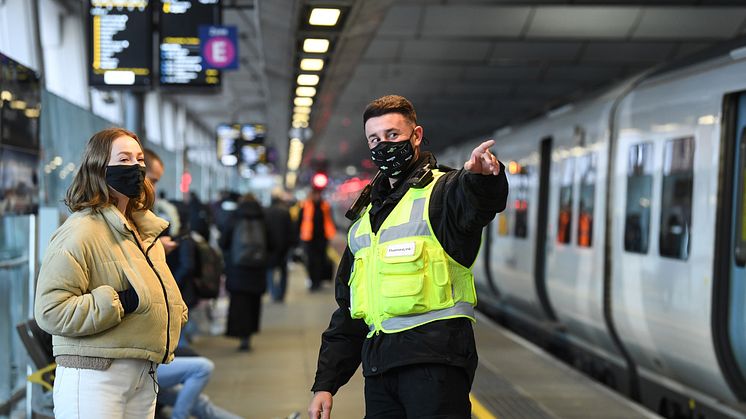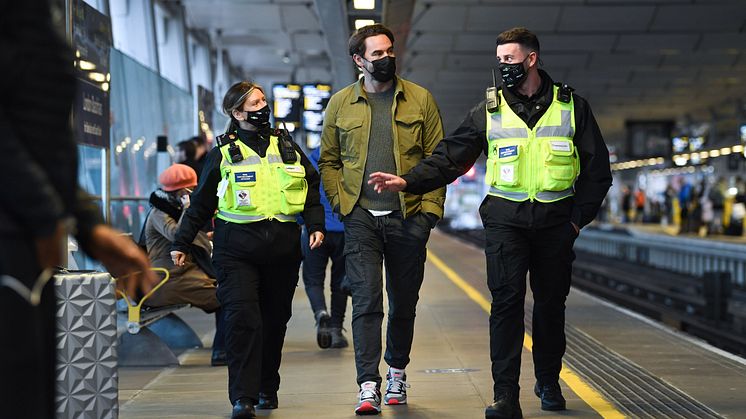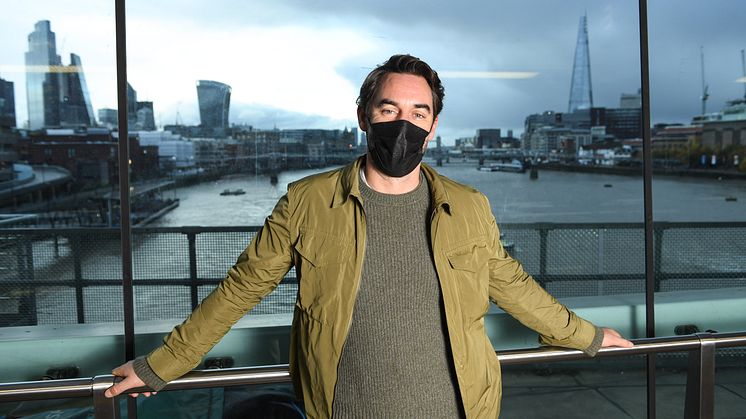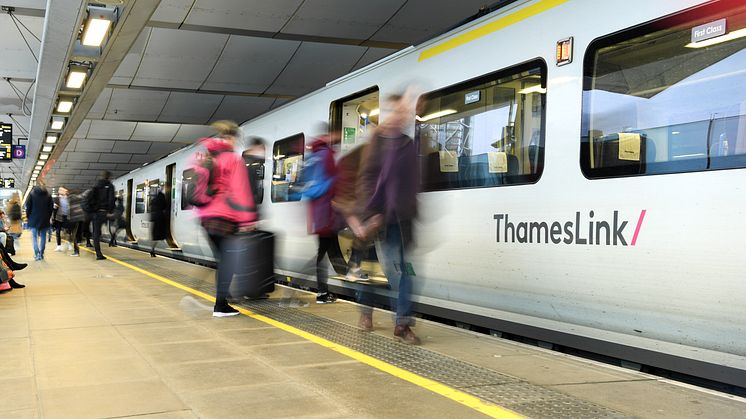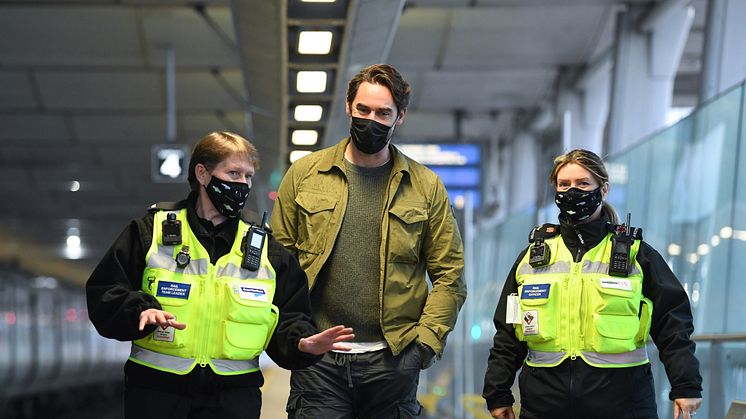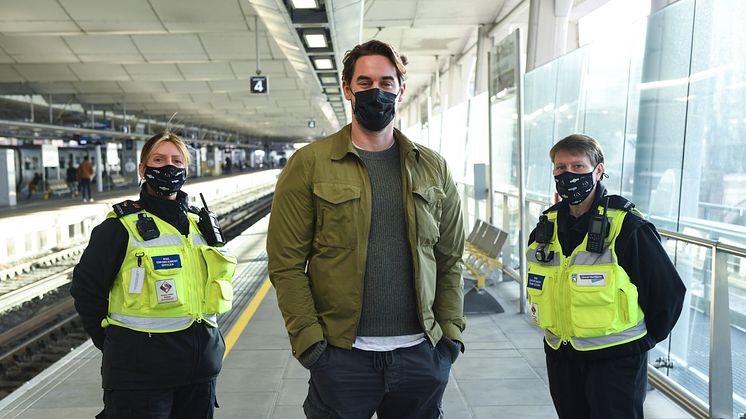
Press release -
Boozy bumps and festive faux pas: how to make sure your Christmas tipple doesn't end in a topple
Rail firm partners with celebrity nutritionist to offer top tips and bust myths about drinking, to help passengers get home safely after a night out.
- Research shows we’re starting festivities earlier and planning to enjoy more celebrations to make up for them being cancelled last year
- Intoxication is the second biggest cause of accidents on the railway
- Nutritionist Rob Hobson shares his top tips and busts common myths about drinking
With 2020’s festivities cancelled due to the pandemic, many are looking forward to reconnecting with friends and family we didn’t get to see last year. In fact, research unveiled today shows that Brits are going to be making up for lost time, with one in four (23 per cent) starting the celebrations early this year.
As we move into the festive period, many of us are planning party outfits and looking forward to a host of celebrations to see us through to the New Year. Not only are festivities starting earlier, but we’re planning on partying harder with one in six (16 per cent) Brits attending more Christmas celebrations this year to outweigh last year’s lack of.
However, rail firms Southern, Thameslink and Great Northern warn that more celebrations over the festive period increase the risk of something else too: alcohol-related accidents. Also, sadly 20% of assaults on the network in the last year identify intoxication as an immediate cause.
According to analysis from The Rail Safety and Standards Board, slips, trips and falls caused by intoxication are more likely to lead to severe injuries, with intoxication the second biggest cause of accidents, second only to human error or other slips. Last year alone there were 1079 incidents on the railway, with 12% of passenger accidents on the Southern, Thameslink and Great Northern network attributed to intoxication in that time.
Whilst it’s fun to enjoy bottles of bubbly, mugs of mulled wine and the occasional Christmas cocktail over the festive period, the railway has teamed up with registered nutritionist Rob Hobson to help Brits get through unscathed and ensure their tipple doesn’t lead to a topple*. His ‘12 Myths of Christmas Drinking’ encourages people to drink safely, explains why mixing drinks won’t make a difference to how you feel the next day and that ‘beer before wine’ is simply folklore.
Sam Facey, Head of Zero Harm at Govia Thameslink Railway, which operates Southern, Thameslink and Great Northern services, said: “People understandably want to make up for lost time this year but we know that intoxication can lead to accidents whilst travelling on the railway. I’d encourage party-goers to keep Rob’s tips in mind, celebrate responsibly and to take extra care on our stations and trains during the festive season, and don’t forget to wear a face covering, unless exempt.”
Rob Hobson comments: “The research shows that there are more accidents on the railway around the festive time, predominantly because people are busy boozing! So, I’ve teamed up with GTR to debunk some common myths around drinking and sharing some tips to help Brits get home safely after office parties and drinks with friends.
“Whilst it’s fun to go out celebrating, alcohol can lower our inhibitions and affect our judgement, so take care when travelling home so you don’t accidentally harm yourself or those around you when using the escalators and waiting on the platform.”
*Please always drink responsibly
Rob Hobson shares his ‘12 Myths of Christmas Drinking’:
1. Don’t start drinking on an empty stomach
We’ve all been told this in the past, but it really isn’t a good idea. Drinking on an empty stomach causes a more rapid rise in blood alcohol levels, meaning you will quickly feel the effects. It’s easy to do, especially if you’re going for drinks straight from work.
To help you travel home safely after the office drinks, make sure to eat something before hitting the bar, even if it’s just a supermarket sandwich en route.
2. Myth: Beer before wine is fine
There are many variations of this common adage that suggests the order in which you consume different alcoholic drinks may impact on how drunk you get and how rough you feel the following day. Unfortunately, this proverb is nothing more than folklore. Research published in the American Journal of Clinical Nutrition showed that neither the type nor order of consuming alcoholic drinks significantly affected the intensity of a hangover based on symptoms such as thirst, fatigue, headache, dizziness, nausea, and stomach ache.
3. Take the night off, it’s fine to not drink at all!
If you’re the person who has a social event night after night, you may fancy a night off. Remember there’s no pressure to drink! This also means you won’t miss the last train home from being distracted by the booze.
Thanks to the huge increase in low alcohol beers and zero alcohol spirits, you can keep this on the DL if you don’t want to tell your mates you’re not drinking. Pour low alcohol beers into a glass and accompany your alcohol-free ‘G&T’ with the suitable garnishes to act as the perfect disguise.
4. Make your drinks go further
UK guidance for alcohol is no more than 14 units per week, equivalent to 5 medium (175ml) glasses of wine, 6 pints of beer or 14 single shots of spirits. If you’re conscientiously trying to monitor your intake, then get a little savvy to make your units go further on a night out.
Opting for a lager shandy or white wine spritzer means half the units of the original drink. If you enjoy spirits, order singles and top them up with mixers, which will also help you to hydrate as the evening goes by.
Also, it’s better to spread units over the week rather that saving them up for a binge drinking session.
5. Alcohol is a stimulant and gives you confidence
Alcohol is actually a depressant; it sedates the central nervous system. One of the first areas of the brain to be affected is the cerebral cortex, which controls judgment, self-control, and inhibitions. The depression on this part of the brain may result in excitable behaviour, as inhibitions are lost which may be great for karaoke and awkward office night out chat, but this is false confidence as you’re not in control, and poor judgment and a lack of inhibition could leave you in many tricky situations.
Having spent an extra 10 minutes in the bar having a final shot of tequila, you might find yourself having the confidence to run for your train so you don’t miss it. But the lack of self-control can cause nasty accidents at the station, so make sure you leave enough time to catch your train.
6. Myth: Mixing your drinks makes you more drunk and hungover the next day
Your body cannot differentiate a glass of wine from a pint of beer. If you’re mixing your drinks, it’s likely you’re just drinking more than you usually would, hence the horrendous hangover the next day.
7. Myth: Once you've "broken the seal" you'll be needing the bathroom constantly
Well, it might not be constantly, but you will definitely need to use the bathroom more often after drinking and this also depends on what and how much you have drunk. Alcohol blocks a hormone called vasopressin (anti-diuretic hormone), which helps the body hold on to water. This is also why you get more dehydrated, contributing to how rough you feel the following day.
Electrolyte sachets may be a good option before you go to bed after a drinking session to help rehydrate, and make sure to pick up a bottle of water for your train journey home.
8. Myth: Alcohol warms the body
Ever heard of a ‘beer jacket’? Alcohol causes a false sense of warmth as it dilates the blood vessels sending more blood to the skin, making your face flush and meaning you feel warmer. However, this causes you to lose body heat to the outside environment more quickly – so make sure to dress for the UK’s winter weather and not rely on the infamous beer jacket.
9. Myth: Strong coffee will sober you up
You may feel more alert during the first few hours of drinking alcohol, but it can make you feel sleepy later. Drinking a strong coffee rich in caffeine may help quell tiredness as this compound stimulates the nervous system. Still, it doesn’t speed up the rate at which the body metabolises alcohol or remove the dizziness and other side-effects of booze.
While a strong coffee will not sober you up, it might make you more alert for your journey home so you don’t nod off on the train.
10. Myth: Alcohol helps you to sleep
Yes, alcohol has a soporific effect that may help you nod off (make sure to not fall asleep on your train home!), but this doesn’t mean you will get a good night’s sleep and even less so after a heavy night on the town. You’ll also be waking up throughout the night either to use the bathroom, or quench the dehydration associated with too much booze.
Scientifically, alcohol does disrupt your sleep cycle. Just after you have fallen asleep, alcohol bids to GABA receptors in the brain which slows down the central nervous system, inducing sleep. During this time, you spend more time in deep sleep and less time in the more restorative REM sleep. When alcohol starts to leave your blood stream, your central nervous system becomes dominated by glutamate, stimulating the brain and causing you to get more REM sleep which is much lighter and often less steady. This is also the stage when dreams occur, so you may experience more intense dreams or nightmares after drinking.
11. Your choice of drink could influence how bad you feel the next day
Too much of any alcoholic drink can leave you feeling rough the following day. However, research shows that dark coloured drinks could make things a whole lot worse. Red wine and brown spirits contain a high level of compounds called congeners. These compounds are impurities produced during the fermentation process that contribute to the taste, aroma, and appearance of dark coloured drinks.
12. Myth: Painkillers before bed help to ease a hangover
While painkillers can help relieve the headaches and muscle aches associated with hangovers, their effects wear off after 4 hours or so. Therefore, it makes no sense to take them before you go to bed. If you’re really suffering the following day, try ibuprofen over paracetamol as the latter may interfere with liver function.
-ENDS-
Notes to Editors
Survey conducted by Opimium with 2,000 respondents, data correct as of November 2021.
About Rob Hobson
Rob Hobson is one of the UK’s most well respected and highly trained nutritionists with over 15 years’ experience. His passion for nutrition extends to his talent for cooking, which led him to co-author the hugely successful book, “The Detox Kitchen Bible” (Bloomsbury, May 2015) that has now been released in both hardback and paperback editions around the world. Rob has worked within the NHS and Government agencies in many areas including child and maternal health as well as working with many leading food and nutrition companies and health retreats around the world.
Key Facts
- All trains have air conditioning which continually refreshes the air in each carriage every 6-9 minutes
- Alerts will show busy trains in online journey planners such as National Rail Enquiries, where you can also subscribe to journey alerts and see information on busier services
- Weekly Covid safety checks are carried out across trains and stations, looking at cleaning, passenger information, social distancing and the wearing of face coverings
- GTR sanitises all 2,700 of its train carriages every night and uses a long-lasting viricide across stations and trains which kills coronavirus for weeks at a time
- Independent laboratory results show that Southern, Thameslink and Great Northern trains are testing negative for Covid-19
- Over 1,000 touch-free hand sanitisers have been installed at stations
- To keep passengers and staff safe, there is an enhanced cleaning regime focused on touch points: GTR has hired more than 100 extra cleaning staff and treats its trains, stations, offices and other staff locations with a powerful long-lasting viricide which sticks to surfaces and kills viruses for weeks at a time.
- One-way and queuing systems at the busiest stations, with 19,000 floor signs across the network, 25,000 train signs, posters, adverts and announcements
- Twice-weekly rapid lateral flow tests of asymptomatic staff to provide added protection and reassurance for colleagues and passengers
- E-tickets are available at 60 stations
- Order a free Key smartcard online, buy a new season ticket online, and add it to your card simply by tapping it to your phone or a station ticket gate or validator
Topics
Categories
For more information, contact the press office on 0203 750 2031.
Govia Thameslink Railway
Govia Thameslink Railway (GTR) operates Thameslink, Great Northern, Southern and Gatwick Express services as follows:
- Thameslink – cross-London services between Bedford/Peterborough/Cambridge and Brighton/Horsham/Littlehampton/East Grinstead, and between Luton/St Albans and Sutton/Wimbledon/Rainham; plus services between London and Sevenoaks
- Great Northern – services between London and Welwyn, Hertford, Peterborough, Cambridge and King’s Lynn
- Southern – services between London and the Sussex coast (Brighton, Worthing, Eastbourne, Bognor Regis, Hastings) and parts of Surrey, Kent and Hampshire (Ashford International, Southampton, Portsmouth)
- Gatwick Express – fast, non-stop direct services between Gatwick Airport and London Victoria
www.southernrailway.com, www.thameslinkrailway.com, www.gatwickexpress.com, www.greatnorthernrail.com


